
Kumasi is a city in Ashanti Region, and is among the largest Metropolitan areas in Ghana. Kumasi is near Lake Bosomtwe, in a rain forest region, and is the commercial, industrial and cultural capital of the historical Ashanti Empire. Kumasi is approximately 500 kilometres (300 mi) north of the Equator and 200 kilometres (100 mi) north of the Gulf of Guinea. Kumasi is alternatively known as "The Garden City" because of its many beautiful species of flowers and plants in the past. It is also called Oseikrom.
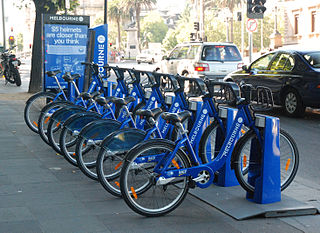
A bicycle-sharing system, public bicycle scheme, or public bike share (PBS) scheme, is a shared transport service in which bicycles are made available for shared use to individuals on a short term basis for a price or free. Many bike share systems allow people to borrow a bike from a "dock" and return it at another dock belonging to the same system. Docks are special bike racks that lock the bike, and only release it by computer control. The user enters payment information, and the computer unlocks a bike. The user returns the bike by placing it in the dock, which locks it in place. Other systems are dockless.

The Millennium Development Goals (MDGs) were eight international development goals for the year 2015 that had been established following the Millennium Summit of the United Nations in 2000, following the adoption of the United Nations Millennium Declaration. These were based on the OECD DAC International Development Goals agreed by Development Ministers in the “Shaping the 21st Century Strategy”. The Sustainable Development Goals (SDGs) succeeded the MDGs in 2016.

Asante Kotoko Sporting Club, also known as Asante Kotoko, is a professional football club from Kumasi, Ashanti Region in Ghana West Africa. Their home grounds is based at Baba Yara Stadium in Amakom, Kumasi. They compete in the Ghanaian Premier League. They have been champions of the Ghana Premier League a record 24 times, have won the CAF Champions League twice and were adjudged the African club of the century by International Football Federation of History and Statistics. They are also called the Porcupine Warriors.
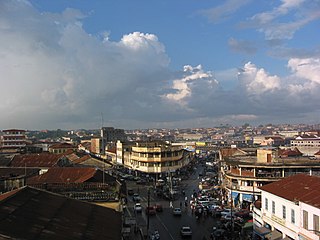
Kumasi Metropolitan Assembly is one of the 260 Metropolitan, Municipal and District Assemblies (MMDAs) in Ghana and forms part of the forty-three districts in Ashanti Region, Ghana with Kumasi being its administrative capital. The metropolis is located in the central part of Ashanti Region and has Kumasi as its capital city.
Millennium Promise, or The Millennium Promise Alliance, Inc., is a non-profit organization incorporated under the laws of the State of Delaware, dedicated to ending extreme poverty within our lifetime. Its flagship initiative is the Millennium Villages Project, which highlights how integrated, community-led development, even in some of the poorest communities across rural sub-Saharan Africa, can lead to progress in achieving the Millennium Development Goals (MDGs) and can provide communities with the basic tools and necessities to break out of poverty, on the path toward self-sustainable development. Millennium Promise oversees the Millennium Villages Project in collaboration with the Earth Institute at Columbia University and the United Nations Development Program (UNDP).

The Ghana Army (GA) is the main ground warfare organizational military branch of the Ghanaian Armed Forces (GAF). In 1959, two years after the Gold Coast obtained independence as Ghana, the Gold Coast Regiment was withdrawn from the Royal West African Frontier Force, and formed the basis for the new Ghanaian army. Together with the Ghanaian air force (GHF) and Ghanaian navy (GN), the Ghanaian army (GA) makes up the Ghanaian Armed Forces (GAF), controlled by the Ghanaian Ministry of Defence (MoD) and Central Defence Headquarters, both located in Greater Accra.

Italvega is a brand of road bicycles designed, specified, imported and marketed by the California-based bicycle distributor, Lawee, Inc., founded by Ben Lawee, who also created the Univega and Bertoni bicycle brands.
The Millennium Villages Project (MVP) was a demonstration project of the Earth Institute at Columbia University, the United Nations Development Programme, and Millennium Promise aimed at proving that its integrated approach to rural development can be used to achieve the Millennium Development Goals—eight globally endorsed targets that address the problems of poverty, health, gender equality, and disease—by 2015.
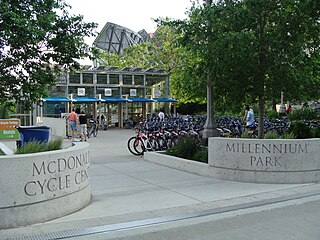
McDonald's Cycle Center is an indoor bike station in the northeast corner of Millennium Park in the Loop community area of Chicago, in the U.S. state of Illinois. The city of Chicago built the center at the intersection of East Randolph Street and Columbus Drive, and opened it July 2004. Since June 2006, it has been sponsored by McDonald's and several other partners, including city departments and bicycle advocacy organizations. The bike station, which serves bicycle commuters and utility cyclists, provides lockers, showers, a snack bar with outdoor summer seating, bike repair, bike rental and 300 bicycle parking spaces as of 2004. The Cycle Center is accessible by membership and day pass. It also accommodates runners and inline skaters, and provides space for a Chicago Police Department Bike Patrol Group.

Bamboo bicycles are pedal-and-chain-driven, human-powered, single-track vehicles that have two wheels attached to a bamboo frame. Because of its light weight, vibration damping, and sustainability, bamboo is slowly starting to be used in bicycle frame production, though the industry is still dominated by aluminium frames.

Hillsboro Intermodal Transit Facility (HITF) is a parking garage with extensive bicycle facilities located in Hillsboro in the U.S. state of Oregon. Located next to Tuality Community Hospital, the facility has nearly 800 parking spaces, including 13 that have charging stations for electric vehicles, as well as 35 secured spaces for bicycles that include showers and lockers. Opened in 2010, HITF also has 20,000 square feet (1,900 m2) of commercial space, which is mainly used by Portland Community College’s Hillsboro Center. The $16 million facility was a joint project between the city, Pacific University, and Tuality Healthcare.

The Ghana Prisons Service is responsible for the safe custody of prisoners in Ghana, as well as their welfare, reformation and rehabilitation. It is under the jurisdiction of the Ministry of the Interior.

World Bicycle Relief is an international, non-profit organization based in Chicago, IL that specializes in large-scale, comprehensive bicycle distribution programs to aid poverty relief in developing countries around the world. Their programs focus primarily on education, economic development, and health care. As of February 2020, World Bicycle Relief has distributed 500,000 bicycles in 21 countries and trained more than 2,300 bicycle mechanics in the developing world. Within their largest program, the Bicycles For Educational Empowerment program, nearly 70 percent of the student bicycles are designated for girl students.
David Ho is an American scientist who works at the University of Hawaii at Manoa. He is known for his work on air-sea gas transfer, mangrove carbon cycling, and tracer oceanography. He also created the Bamboo Bike Project, with John Mutter in 2006, which has spurred growth in the number of groups and companies creating bamboo bicycles around the world.
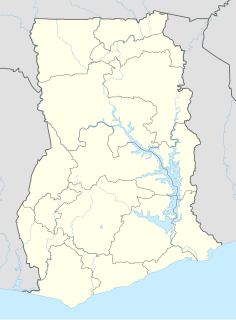
Offinso, the once capital of Offinso District is a town in the Offinso Municipality in the Ashanti Region of Ghana - the town is about fifteen minutes drive from Kumasi, the capital of the Region; due to Offinso's proximity to Kumasi, many of the Offinso natives have relocated to Kumasi.

Baisikeli Ugunduzi is a for-profit social business that specializes in bicycle components for the Sub-Saharan African market. Baisikeli Ugunduzi means innovative or modern bicycles in Swahili. It was founded in the winter of 2011 by Ben Mitchell, whom holds a MS in mechanical engineering as is currently seeking his PhD at Michigan Technological University and John Gershenson, a professor of mechanical engineering at MTU.Baisikeli Ugunduzi is headquartered in Kitale, Kenya, Africa. It is considered a for-profit social venture, where it develops human-centered products, which seeks to raise the income of boda boda, who rely on the bicycle as a means of livelihood.
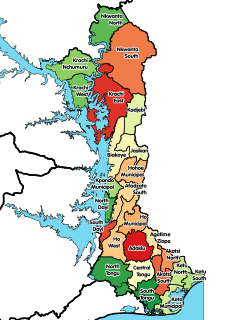
Ho West District is one of the eighteen districts in Volta Region, Ghana. Originally it was formerly part of the then-larger Ho District in 1988. Later, part of the district was later split off to form the new Ho West District on June 2013; thus the original remaining part was upgraded to municipal district assembly status on that same year to become Ho Municipal District. The district assembly is located in the central part of Volta Region and has Dzolokpuita as its capital town.
Bernice Dapaah is a Ghanaian entrepreneur who is the founder and Chief Executive Officer of the Ghana Bamboo Bike Initiative in Kumasi. This Initiative addresses environmental degradation through the production of bicycles using environmentally friendly resources such as bamboo. She and her company, Ghana Bamboo Bike Initiative have won several awards. In 2016 and 2017 she was listed as one of WomanRising's 100 Most Outstanding Women Entrepreneurs in Ghana. Dapaah sits on the advisory board of the World Intellectual Property Organisation Green in Switzerland and is the founding curator of the Kumasi Hub of the Global Shapers. In addition, she is a member of the World Economic Forum Global Agenda Council on Biodiversity and Natural Capital.
Winnifred Kyei Selby is a young Ghanaian social entrepreneur and the president of the EPF Educational Empowerment Initiative based in Kumasi, Ashanti Region of Ghana. She co-founded the Ghana Bamboo Bike Initiative with Bernice Dapaah at the age of 15. And At age 17, she established another business, the Afrocentric Bamboo Initiative. In 2018, she became the first Ghanaian to be inducted into the Royal Institute of Singapore.














